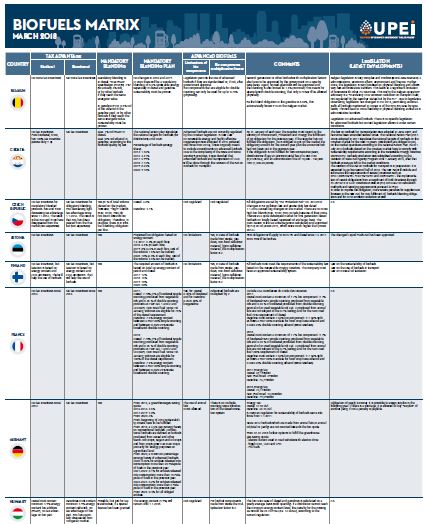Transport
Being the closest to the consumer in the fuel supply sector, independent fuel suppliers are in a unique position to respond to today’s transport sector challenges. They have been at the forefront of the introduction of alternatives to oil products in Europe, including biofuels, requiring significant investments to adapt infrastructure and distribution systems. These investments are continuing, together with the diversification of fuels supplied. In order to safeguard and optimise the independents’ contribution to the transition to a low carbon economy in Europe, UPEI stresses the need for new policies to have regard to the reality of markets. Substitution of oil should not be artificially imposed on consumers (or suppliers), at any price. It must take account of past investments, the maturity of alternative solutions as well as respect technology neutrality in order for demand to be met with affordable and competitive products on the basis of a level playing field.
UPEI participates in the ART Fuels Forum (European Alternative and Renewable Transport Fuels).
Key areas of EU policy in the transport sector
Alternative Fuels Infrastructure
The EU has set targets for the deployment of alternative fuels infrastructure across Europe in order to promote the further uptake of alternatively fuelled vehicles. Major investments will be required by the fuel retail sector.
UPEI Key Issues
- the need for technology neutrality
- consumer behaviour and demand
- the medium and long term sustainability of the different alternative fuels
Links
Biofuels
Independent fuel suppliers were amongst the first to supply their national markets in biofuels and are significant actors in contributing to meeting the EU’s 10% target for transport fuels frm renewable sources.
UPEI Key Issues
- The need for a stable and predictable legislative framework
- Coherent application of EU legislation across Member States
UPEI Biofuels Matrix
Reports
![]() SGAB final report - Building Up the Future (March 2017)
SGAB final report - Building Up the Future (March 2017)
![]() Obstacles to achieve an internal market for transportation fuels with bio-components (July 2016)
Obstacles to achieve an internal market for transportation fuels with bio-components (July 2016)
Links
- Renewable Energy Directive II (agreed 4.12.2018)
- 2009/28/EC Renewable Energy Directive
- Regulates the production and promotion of energy from renewable sources in the EU. Amended in April 2015 to take account of indirect land-use change (ILUC).
- 98/70/EC Fuel Quality Directive
Regulates the sustainability of biofuels by setting calculation methods & reporting requirements for greenhouse gas emissions of biofuels.
Fuel Quality
The Fuel Quality Directive (FQD) requires fuels suppliers to reduce by 6% in 2020 (compared with 2010) the life cycle greenhouse gas intensity of the road fuels deployed in the EU. The FQD applies to all petrol, diesel and biofuels used in road transport, as well as to gasoil used in non-road-mobile machinery and specifies reporting requirements for fuel suppliers.
UPEI Key Issues
- Compliance with reporting requirements whilst limiting administrative burden and costs
Key Documents
Links
- 98/70/EC Fuel Quality Directive
Regulates the sustainability of biofuels by setting calculation methods & reporting requirements for greenhouse gas emissions of biofuels. - 2009/30/EC amending 98/70/EC
Specifications for petrol, diesel and gas-oil and monitoring and reduction of greenhouse gas emissions. - 2015/652 Council Directive (EU)
Laying down calculation methods and reporting requirements for Directive 98/70/EC (article 7a)
Fuel Labelling
Linked to the implementation of the EU Directive on the deployment of alternative fuels infrastructure UPEI participates in the TC 441 CEN Technical Committee, responsible for drawing up Europe wide fuel labelling standards in order to develop common symbols, or ‘fuel identifiers’ to improve the information given to consumers who are faced with a choice of fuels for their vehicle. As of October 2018, these 'fuel identifiers' have been placed on new vehicles and at fuel pumps.
A dedicated multi-lingual website with full details and information on the fuel identifiers can be consulted at www.fuel-identifiers.eu
UPEI Key Issues
- Keeping consumers at the heart of this initiative
- Ensure a practical and cost effective labelling system with an appropriate time frame for implementation
- Safeguard the right of fuel retailers to maintain their own marketing practices for fuels sold on the forecourt
Maritime Transport
With 80% of freight transport in Europe being seaborne, the maritime sector has an important role to play, also in the transition towards a low-carbon economy. Significant improvements have already been achieved with the sulphur content of bunker fuels under Directive 2012/33/EU, which limits sulphur content to maximum 0.10% (SECA) .
UPEI Key Issues
- The need for a level playing field on maritime transport emissions



